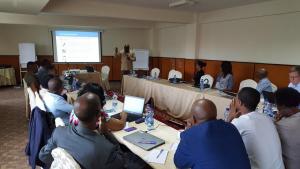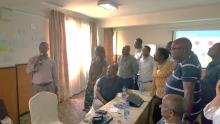WHO Country Office (WCO) Ethiopia trains staff on Theory of Change
Globally the work of WHO is shifting towards result-based management (RBM) in general and the theory of change (ToC) in particular. This is driven by alignment of the work of WHO with the WHO transformation programme as well as the 13th General Programme of Work (GPW13) already endorsed by the Executive Committee and expected to be endorsed by the World Health Assembly by the end of May 2018.
Consequently WHO/AFRO had planned to train each WHO country team on TOC. The Ethiopia TOC workshop was held from the 7 to 11 MAY 2018 at Executive Hotel in Adama.
The workshop was aimed to enhance the knowledge and capacities of staff in the application of result-based management (RBM) and the Theory of Change (Toc); and to equip participants with knowledge and skills required to apply the ToC principles to current interventions at country level.
A total of 28 WHO staff drawn from the country office technical programmes and operations teams participated in the ToC workshop facilitated by a consultant, Dr. Noel Ihebuzor. There were plenary sessions with presentations as well as group work sessions, making it very participatory.
Participants covered the principles of result-based management with emphasis on contrasting “results focus” with ‘resource/activity focus’ that was hitherto the practice in WHO. Additionally, the ToC concept was examined with focus on its benefits as well as the benefits of RBM in the planning of WHO interventions. This was followed by the session on ‘causality analysis.’ Towards the latter, participants organized in groups of four, examined the concepts and spectrum of causes, causal logic and hierarchy of causes – immediate underlying and structural causes. Also examined were key filters that support prioritization and selection of deprivation areas that WHO could address in its programme document.
On day 2 of the theory of change training, participants were assigned real life problems – Obesity and Malaria - as health challenges/deprivations and were requested to apply causality analysis and its core principles to come up with problem trees for each. Working in groups of five people, participants identified the immediate, intermediate and the underlying root causes for each deprivation identified. Having constructed their respective problem trees, each group examined and worked out the links and pathways within the causes. Plenary report back sessions were held and all participants engaged actively, proffering suggestions for the improvement of the outputs of each other’s group.
Building on this, participants were then taken through the flip approach in formulating results and from here to the “United Nations Development Group” results chain and hierarchies within it – outputs, outcomes and impact – with clear definitions for each of these levels being provided. The day ended with a session on how to formulate strategies.
The third day of the training enabled the participants to learn how to identify the linkages between the results chain, hierarchy of results and the Toc, and the difference in the levels of results and how to formulate result statements. For instance participants were led to distinguish between outputs, outcomes and impacts. Thus, participants understood the essentials of a results and measurement framework and how to apply this in programme design in the context of the ToC approach. Participants were later grouped into three and assigned to develop strategic results notes focusing on the following areas: health emergencies; maternal mortality; and hepatitis.
Participants were also taken through the overview of the process of developing strategic results notes. At the end, participants were urged to translate the concepts and principles of ToC and RBM to their routine practice and proceed to draft the strategic results notes.
Finally, evaluation of the workshop was conducted to assess the effectiveness of the training. The workshop was concluded with a briefing on the “prioritization process” by the country office team that had participated in an AFRO briefing of WRs on the GPW13 planning processes.
For further information, please contact:
- MBAZIIRA, Henry, Program Management Officer, WHO Ethiopia; Email: mbaziirah [at] who.int (mbaziirah[at]who[dot]int)




